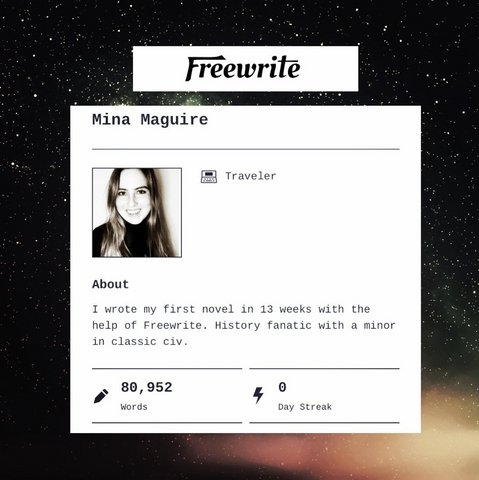
Mina Maguire, "The Witchy Author," wrote her first completed novel in 13 weeks on her Freewrite Traveler. A history fanatic with a minor in classic civ, Mina writes adult fantasy and romance on Traveler, which she loves because it's easy to store and lets her draft anywhere — on the couch, on the train, or at a desk. That's crucial when you've got a deadline to hit!
We sat down with Mina to chat about her writing process and how others can learn to draft fast.
You drafted a book in 13 weeks. Take us through that journey!
I'm currently revising my second book — my first completed book. I tried to draft my first book through a traditional computer word processing program, and I found, like many, that I could not concentrate because of how distracting my computer desktop was and the easy access to the internet (ahem, social media). I did not finish that book as the lack of concentration led me to lose interest in it.
For my second (current) book, I began drafting my story on a different word-processing program specifically for writers, but I still could not concentrate on my story. When I was about 2,000 words in, I saw an ad for Freewrite about an author who wrote 45,000 words in 45 days and I was sold on the product. I purchased my Freewrite Traveler the following week.
What was your writing schedule like?
I committed to drafting between 500-1,000 words per day, and before I knew it, I had amassed about 75,000 words. It was incredible to watch my progress. Some days I wrote 500 words and others I pushed myself to write 3,000 words.
As a mom, schedules during the day can be unpredictable but I set time aside every night from about 9 p.m. to 12 a.m. to write. At times, it was not easy to find the energy, but Freewrite helped me focus. I knew that as soon as I sat down to draft, I had a limited time to get my word count in.
The word counter on the bottom of the screen helped me keep going!

What advice do you have for others trying to draft fast?
Build a habit by setting time aside each day, even if it's thirty minutes, to draft. The Freewrite Traveler has a timer option on the screen to let you know how much time has lapsed — it’s a nice feature!
Also, good hydration (whether it be water or a margarita, or two) and a playlist while drafting also go a long way.
Somebody else in your household likes writing time, too, don't they?
My dog! He likes to lay next to me while I draft because he knows it provides quiet time in a busy household. It’s our Freewrite time!
How can we follow along on your writing journey?
You can learn more about my work at www.darkromanceauthor.com, and follow me on Instagram @Mina_Maguireauthor. You can also follow along on my writing journey at my Postbox Profile.
--

Mina Maguire is a Latina paranormal romance writer who loves a good ghost story. She is a witchy woman who loves Fleetwood Mac, paranormal star-crossed romances, ghost hunting shows, and grew up in a haunted house. For her debut novel in 2024, Mina is taking her love of Egyptian Mythology into a romantic-paranormal twist bringing obscure characters to life in a time-bending fantasy loop of magic and self-discovery.




















